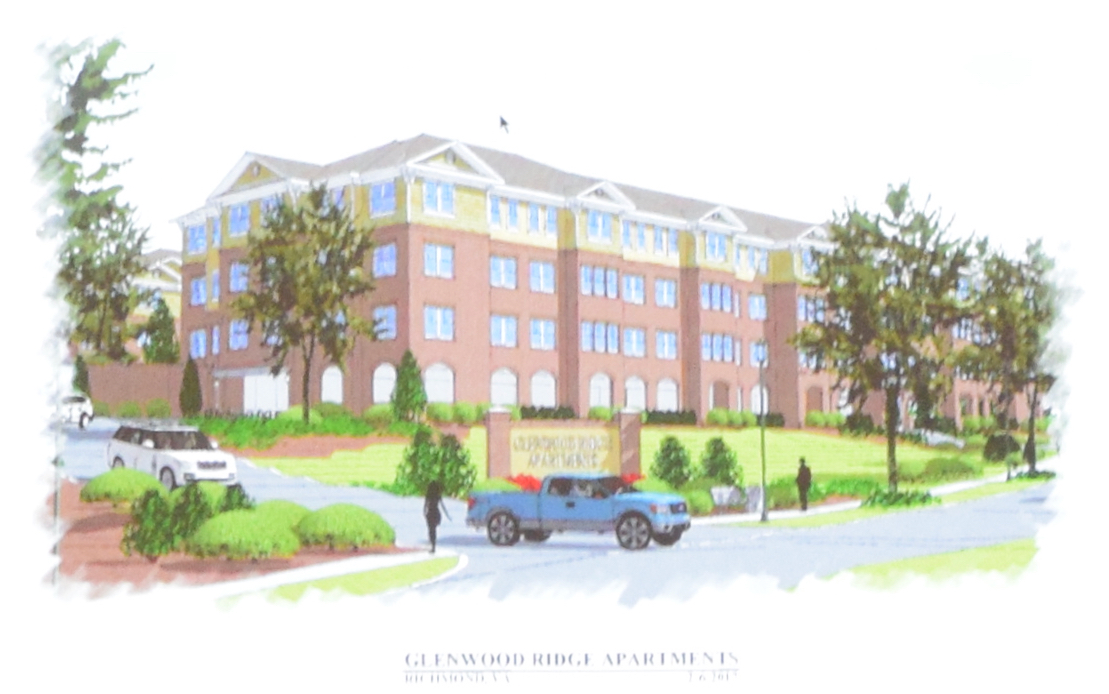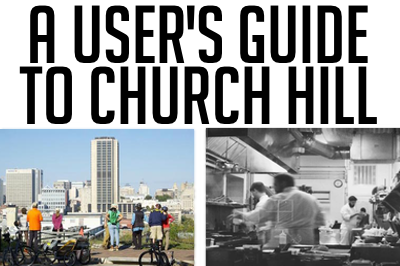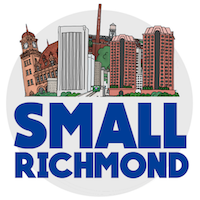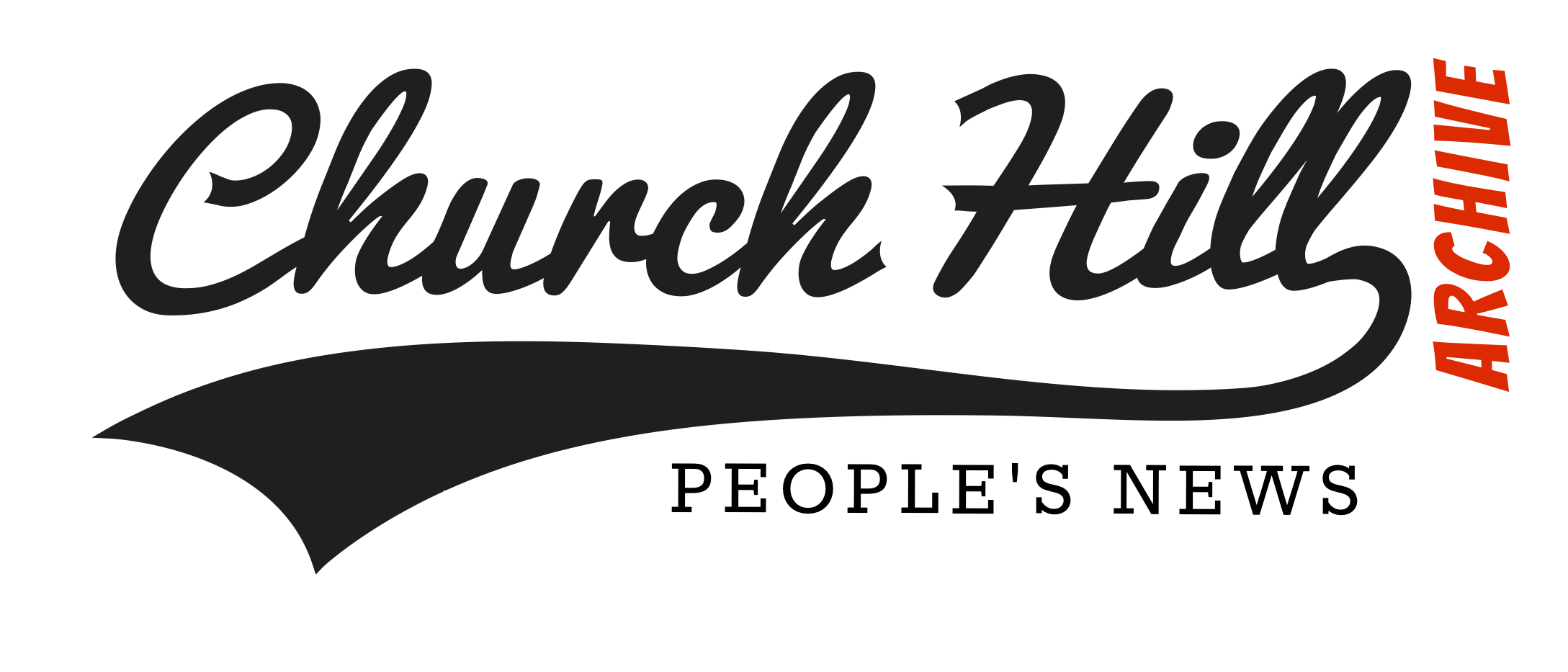RECENT COMMENTS

Have concerns about the proposed Glenwood Ridge Apartments?
There will be a meeting this Thursday, March 9 at 6:00 PM at Fulton Hill Studios, (the former Robert Fulton Elementary School) at 1000 Carlisle Avenue for concerned neighbors “to share our thoughts on the project, it’s current status with the city, and the various avenues in which there could be an opportunity to prevent this from moving forward.”
A public meeting with the developers of the project has been set for March 30, 2017, at the Powhatan Recreation Center at 6:30 PM.
The proposed 82-unit, affordable housing apartment complex consists of two 3-story (on a podium) buildings on the site of the old trolley barn off of Glennwood Avenue.
The project is by-right based on the the zoning (zoned R-63 in 2010), with 82 units an effective under-utilization of the potential density of the location. The project is in the early stages and still need to go before Planning and to be permitted by the city. Doran stated that they hope to have permits by April.
The first meeting with Shane Doran from the Humanities Foundation and lawyer T. Preston Lloyd, Jr. of Williams Mullen was hastily organized in early February after the demolition permit for the trolley barn came to light.






Thank you for sharing, John!
Thank you! It is important all the concerned neighbors attend if we do not want another area like Wihtcomb court!
20 Units are Section 8 according to what I just read. They are also having problems with the demolition permits. We need to get that barn registered as a historically significant landmark. I would love to try to fight this more as a Glenwood home owner, but I’m working out of town. I’m hoping to list the house next week anyways.
Hey guys – Fulton homeowner here – please don’t attack me, I just honestly want to understand the opposition to this. What is wrong with a new/affordable housing for low income families? Is it just the design that’s unappealing? Thanks.
Juli,
It is that it brings down home value. We already have plenty of affordable housing in the city limits (more public housing per capita than most cities in the US).
It’s not like we’re San Francisco where affordable housing is very much in need. There is an over abundance of it in RVA.
@ Juli – my concern is that public and affordable housing in the city both tend to be concentrated in large buildings or tracts that are EXCLUSIVELY public or affordable housing. This isolates low income residents from the rest of the city socially and geographically which has a lot of unfortunate side effects. For example, geographic isolation can make it difficult for low-income residents to find jobs, especially if they do not own a vehicle. While it’s harder to measure or quantify, the resulting social isolation appears to deny low-income residents access to the sorts of social connections that could help them get ahead, such as a referral to and/or a favorable mention for a job opening.
Regardless of home values or other NIMBY concerns, mixed income housing is a much better affordable housing solution.
The developer isn’t even building a playground for the children who live there. Where are they supposed to play? There will not be sidewalks to take them anywhere. The entire site will be cut off from the rest of the neighborhood. One way in, one way out, onto Glenwood, a small narrow street that already has a hard time accommodating the traffic that zooms up and down isolate people of low-income into what is essentially a cul-de-sac/holding pen.
The only one that benefits is the developer (LIH tax credits).
Just pulled up the city code on R-63, not sure this development meets the intent of R-63:
“Intent of district. Pursuant to the general purposes of this chapter, the intent of the R-63 district is to encourage development of medium density neighborhoods comprised of a mix of residential uses and to promote a pedestrian oriented urban environment that is primarily residential in character, but that includes limited nonresidential uses that serve many of the day-to-day convenience needs of neighborhood residents and provide opportunities for residents to live and work within the neighborhood. The district is intended to be applied within or in close proximity to areas of the city that reflect an urban scale of development and afford convenient access to major employment centers and community facilities, and to encompass undeveloped or underdeveloped properties comprising areas large enough and with sufficient residential density to enable establishment of a cohesive neighborhood.”
Excellent find Trish!!
Can anyone with development or planning experience or knowledge elaborate on whether this is in fact an issue here?
Glenwood Ave Property Owner/Landlord/ African American:
I would be open to senior citizens w/ fixed income housing / or mixed income village style projects. As far as a low income / housing project in an area that is finally increasing in property values, far away from jobs, grocery stores within walking distance, and an extremely inadequate GRTC transit line, I’m against! Does anyone know that status of this project thus far? I received a packet that had another hearing date for 9/18/2017. Please advise / chime in if you have any other details regarding this proposed project.
For the people complaining about the decrease in property values: just remember that you are part of the reason a lot of these people can’t afford to live in the area anymore. You’re driving the value up (which is good for you,) but you’re making it harder for the pre-existing residents to maintain. Have a little compassion beyond your self-centered world.
I see rising property values as good for anyone who owns property.
In the same way that those who held property during the urban depopulation (known somewhat accurately as white flight) lost personal and family wealth, those who hold it now are gaining personal and family wealth. That includes a lot of long time residents whose home was worth 40k not that long ago, and is now worth 150-500.
Not that the cultural politics of this particular reality are always comfortable or good…. and not that the culture of churchhill pre-gentrification was always comfortable or good.
For me the argument against this Glenwood development has nothing to do with property values. The issue here is concentrating poverty in two large buildings that will combine to over 80 units and probably 250-300 people. Concentrated poverty does not benefit the community nor does it benefit the residents of the development. How many articles over the years have we all read about how Creighton Court, Fairfield Court, Gilpin, etc have been sited as the source of persistent problems in the low income black community. This proposed development essentially repeats those sins of the past – just with a private developer from South Carolina skimming profit out of the situation.
The best model for this site, if you wanted additions to the affordable housing stock that would be successful, would be townhouses that were mixed income. With 30 percent set aside as affordable and the rest market rate.
I agree with comment from #13, Paul. I understand that the pay scale for many jobs is fairly low and there’s a need for affordable, decent housing for people everywhere. The East End has more than its fair share of low income and public housing and doesn’t need a project like this. A mixed income development would be more suitable to the area.
My main concern is the spread of gun violence that has spiked this year, not just in the usual hotbeds, but right near Glenwood and the area nearby. When men think that the only way to be respected, get revenge over a ‘business’ transaction, or solve a domestic dispute is down the barrel of a gun, I don’t want any part of it. I don’t care if my attitude is NIMBY, I don’t want to increase the odds of more bullets flying around because someone is pissed off. After almost 30 years of experiencing all the positive changes in the East End, this project isn’t worth the risk.